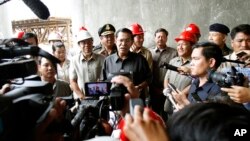Rights workers say they are deeply skeptical of comments made by Prime Minister Hun Sen in support of International Human Rights Day.
The government for the first time held major ceremonies to mark the day, Dec. 10, in what some political analysts say signified a new kind of political awareness by the ruling Cambodian People’s Party, which lost 22 elected National Assembly seats in July.
But rights workers say there is little evidence in practice that supports the notion of a turnover.
Brad Adams, Asia director for Human Rights Watch, called Hun Sen’s promises of improved rights in the country “the same old song.”
“There is no reason why anybody should believe him, because if you or I say year after year we are going to do something, and we don’t it, we would not expect anyone to believe us,” Adams said. “So, he has no credibility. If he really wants to do something, he has the power to do it. And he should stop talking about it and start doing it.”
Hun Sen has held power for three decades, during which the country has seen major rights abuses, Adams said. Those, combined with election fraud, land grabs, a culture of impunity, corruption and widespread deforestation create a poor track record, he said.
Ou Virak, head of the Cambodian Center for Human Rights, said the amount of corruption among government officials makes improving human rights very difficult.
“Some of them have changed,” he said. “But many individuals who violate human rights are still holding key positions in the government. They have a culture of looking down on the poor, and also caste divisions of old habit.”
Impunity remains a problem, with a legal system incapable of punishing wrongdoers in positions of power, he said.
Ny Chakrya, head of investigation at the rights group Adhoc, said human rights need to be practiced, instead of talked about.
“So we will continue to monitor, especially the freedom of expression, the freedom of assembly and others,” he said. While government officials spoke about the importance of rights on Dec. 10, it banned demonstrations on the two days prior, he said. And peace marchers were prevented from taking shelters in pagodas as they marched on the capital. “That’s an issue reflecting rights abuses,” he said.
Authorities have also violated basic rights in restricting demonstrations, by time periods and maximum numbers of protesters allowed, and they have failed to construct public spaces for gatherings in provinces across the country, despite promises to do so, he said.
In his Dec. 10 speech, Hun Sen acknowledged that more needs to be done. But he said people have more freedom that they did when the Khmer Rouge was removed from power, in 1979.
Hun Sen’s Human Rights Speech Finds Little Purchase
- Sok Khemara
- VOA Khmer

WASHINGTON DC —



